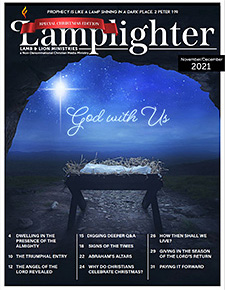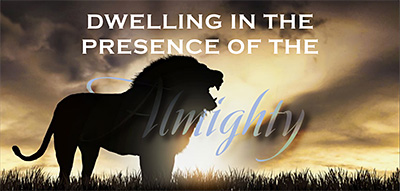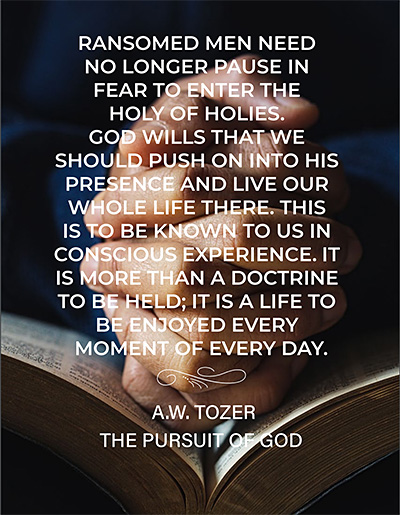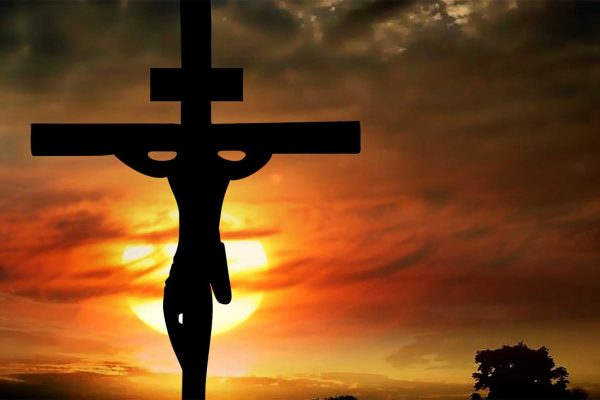Dwelling in the Presence of the Almighty
God with Us
By Tim Moore

“Is he—quite safe? I shall feel rather nervous about meeting a lion.” “That you will, dearie, and no mistake,” said Mrs Beaver. “If there’s anyone who can appear before Aslan without their knees knocking, they’re either braver than most, or else just silly.” “Then he isn’t safe?” said Lucy. “Safe?” said Mr Beaver; “Don’t you hear what Mrs Beaver tells you? Who said anything about safe? ‘Course he isn’t safe. But he’s good. He’s the King, I tell you.” “I’m longing to see him,” said Peter, “even if I do feel frightened when it comes to that point.” ~ C.S. Lewis on Aslan, The Lion, the Witch and the Wardrobe ~

Dwelling with the Almighty sounds like such a wonderful idea. The extended protection of so great a guardian would seem to ensure our safety and well-being. At Christmas we conjure up images of baby Jesus and wistfully think how wonderful it would be to worship Him.
But men and women have always found it strangely perilous to be in the presence of the true and living God. The intersection of the Holy and the profane (which each of us certainly is when compared to Him) creates a tension that is dangerous to say the least.
The profanity of Adam and Eve’s sin ended their communion with God. Because they sinned, they were ejected from the Garden and burdened with toil and inevitable death. Creation itself was cursed.
Israel later learned the peril of dwelling in the presence of God. When His Shekinah Glory filled the tabernacle, not even Moses could enter. The penalty for sullying the camp where the Holy God was present was swift and sure. God’s blessing flowed into the people He chose to dwell among, but His righteous anger was also incited by their faithlessness—perhaps more so because they should have known better.
When Jesus came to dwell among men, his parents learned that their lives and immediate safety were threatened by forces opposed to the newborn King. Shepherds may have come to worship him as he lay in a manger, but Herod’s paranoia and hatred forced Joseph and Mary to flee—and led to the slaughter of many innocent children.
Jesus warned us too that in this world we will have trouble. He said that those who trust in Him and are indwelt by the Holy Spirit will be hated by all because of His name. But, He also assured us that He has overcome the world and that by enduring to the end we will be saved (John 16:33; Matthew 10:22).
Our current Christ in Prophecy television series focuses on Jesus in the Old Testament. As we reflect on the hinge of human history—His first advent—we understand anew His promise that we will dwell with the Almighty.
“Surely goodness and mercy shall follow me all the days of my life, and I shall dwell in the house of the Lord forever.” Psalm 23:6
Finding the Messiah in Leviticus
I was recently paid a back-handed compliment. Recollecting those books of the Bible thought by many to be boring and dull, my pastor remarked that Leviticus is a book “only Tim Moore finds exciting”. He had no idea how true that is!
This 27-chapter book of the Old Testament focuses on the establishment of tabernacle worship and the role of the priestly tribe—the Levites. It also outlines God’s provision for Israel to live in proximity to Him.
Christians may wonder what significance Leviticus has to us. Even Rabbinical Judaism has largely abandoned the Levitical order with its priestly mandates. But when you see Jesus Christ in the book of Leviticus, you will praise Him for the revelation it contains.
Moses recorded the Hebrew Torah—the first five books of our Bible—to convey God’s account of Creation, mankind’s fall, His interaction with an increasingly wicked world, and His relationship with His chosen people. Leviticus immediately follows Exodus, when God delivered His chosen people from captivity in Egypt and led them toward the Promised Land.
The Jewish people learned to depend upon the Lord as they witnessed His power and benefited from His providence. Foreshadowing Christ, Moses was their great deliverer and intercessor. At Mount Sinai he interceded with the Lord on their behalf and was given the Law—including the Ten Commandments. The people affirmed their commitment to a covenant with the Lord, pledging, “All that the LORD has spoken we will do, and we will be obedient!” (Exodus 24:7).
Demonstrating the radical new relationship He was offering, Yahweh invited Moses, Aaron and his sons, and 70 elders of Israel to come up on the mountain. Exodus 24:10-11 says, “they saw the God of Israel… Yet He did not stretch out His hand against the nobles of the sons of Israel; and they saw God, and they ate and drank.” In short, they experienced the blessing Adam had known before the Fall—intimacy with Almighty God.
God gave His chosen intercessor, Moses, specific instructions for the construction of a tabernacle, where He would dwell among the Israelites. After delivering them from bondage in Egypt where they toiled on behalf of Pharaoh (whose name meant “The Great House”), the LORD directed them to construct a dwelling for Him.
Exodus 40:34-35 tells us that once the tabernacle was finished, “then the cloud covered the tent of meeting, and the glory of the Lord filled the tabernacle.” Strikingly, however, Moses—God’s own hand-picked intercessor, the one He had blessed to see His glory (33:17-23; 34:5- 8)—was not able to enter the tent of meeting because “the glory of the LORD filled the tabernacle” (Exodus 40:35). The question this raises is this: If God’s chosen human deliverer Moses cannot enter His divine presence, who can?
The Holy and the Profane in Close Proximity
God revealed the way for sinful people to draw close to Him. Jewish priests dutifully performed a never-ending series of rites to preserve the intersection of the holy and the profane—God and man in close proximity. Following those painstaking rituals, Moses and Aaron were finally able to enter the tent of meeting. As long as Israel followed God’s plan they enjoyed the blessing of dwelling in His presence.
Still, Israel learned the proximity to the Lord is both a blessing and a risk. Who is holy enough to come boldly into His presence without offending His unfathomable holiness? Who is righteous enough to live with Him who defines righteousness?

Who May Ascend the Hill of the Lord?
This question resonates throughout Leviticus—and the entire Old Testament. In the Psalms David spoke poetically of God’s dwelling place and asked, “O LORD, who may abide in Your tent? Who may dwell on Your holy hill?” (15:1). “Who may ascend onto the hill of the LORD? And who may stand in His holy place?” (24:3).
David’s answer sets an incredibly high bar: “He who walks with integrity and works righteousness, and speaks truth in his heart” (Psalm 15:2). And, “He who has clean hands and a pure heart” (Psalm 24:4). Even David, a man after God’s own heart, realized the limits of his relationship with God (1 Samuel 13:14, Acts 13:22). He was not allowed to build the temple (1 Chronicles 28:3). At times he had to pray, “Do not cast me away from Your presence” and express hope to merely “stand at the threshold of the House of [God]” (Psalm 51:10-12, 84:10).
Isaiah stated those eternal questions this way: “Who among us can live with the consuming fire? Who among us can live with continual burning?” (Isaiah 33:14). He then asserted, “He who walks righteously and speaks with sincerity” (Isaiah 33:15). That sounds so simple, so easy, so attainable. But it is not.
None is Righteous; No, Not One
The entire Old Testament documents man’s failure to achieve righteousness. A person might purpose to cleanse their own heart of the leaven of sin, but it proved impossible to wash away the stain. Like indelible ink, it has saturated into our flesh.
“Who may ascend the hill of the LORD? And who may stand in His holy place?” Considering the meticulous preparations the High Priest underwent just to enter the Lord’s holy presence one day a year, hope that any of us can climb the mountain of the Lord to dwell in His presence forever fades very quickly.
Prophetic Hope
And yet the Bible prophesies a day when God will indeed dwell with us and an intimate relationship will be restored. David’s Psalm describes how man will attain such standing with God: “He shall receive a blessing from the LORD and righteousness from the God of his salvation” (Psalm 24:5). The God who saves will impart the righteousness that allows man to enter an everlasting relationship with God.
In the language of Leviticus, the very blessing of ascending the mountain of the Lord—entering into His holy presence and dwelling with Him in intimate communion—would come not by striving but as a gracious, unmerited blessing from the Lord. In fact, instead of us climbing the mountain where God dwells, He would come down from the heavenly mountain and dwell in our midst. His journey on earth began in Bethlehem and ended at Calvary. As the old hymn says,
Heaven came down and glory filled my soul; When at the Cross my Savior made me whole.
God’s Provision for Atonement
Leviticus describes an exacting process for drawing near to God. Yahweh is presented as One so holy—so set apart and full of power and glory—that living in close proximity to Him is perilous. As Aaron’s sons, Nadab and Abihu, learned at the cost of their lives, it shows that we cannot approach God through just any scheme.
Leviticus 16 and 17 prescribes a law of atonement, offering a way to draw near to Him once a year. Atonement refers to the legal reunion of two alienated parties. In essence, it represents the “at-one-ment” of two that were estranged. Atonement required removing impurity and sprinkling blood as a purification offering. The price of atonement is the life of the sacrifice.
As a mediator, Moses was willing to sacrifice himself for his people. Fulfilling that prophetic type, Jesus Christ became the ultimate sacrifice that offers us eternal atone-ment with God. And since He was resurrected and now sits at the right hand of the Father in heaven, He is our great Mediator.
So, Leviticus teaches:
- The only way to approach God is by the way that He has revealed.
- Sacrifice and an ordained priest are necessary to draw near to God.
- The first step is atonement—reconciliation between God and man.
The Way, the Truth, the Life
Jesus said, “I am the way, the truth, and the life. No one comes to the Father but through Me” (John 14:6). The means of salvation could not be clearer—and the stakes could not be more well-defined. Anyone who preaches or pursues any other supposed path to salvation is to be accursed (Galatians 1:8-9).
The Levitical system of tabernacle worship was designed to accommodate the presence of God. “Tabernacle” is both a noun and a verb—meaning the portable dwelling place of the Lord and the action “to dwell.” God proclaimed, “I will make My dwelling among you, and My soul will not reject you. I will also walk among you and be your God, and you shall be My people” (Leviticus 26:11-12).
The priestly system eventually broke down. But King David professed his prophetic hope to “dwell in the house of the LORD forever” (Psalm 23:6). Mankind was created to live in God’s divine presence—in real and eternal relationship with Him. That is why our souls will be restless until we find ultimate rest (what you might call the eternal Sabbath) in Him.
Seeing Christ in Leviticus
There are many other prophetic foreshadowings of Jesus Christ in Leviticus. I will mention five:
- The sacrifice brought before the Lord had to be spotless and pure (Lev. 1:3; 3:1; 4:3; 5:15). – Jesus was the spotless Lamb of God (1 Pet. 1:19).
- A priest—a set-apart son of Adam—was required to offer blood in order to secure atonement for the chosen people of God (Lev. 1:15, 2:16, 3:16, 4:16). – Jesus (the last Adam and perfect priest in the order of Melchizedek) secured our atonement with His own blood (Heb. 7:14-28, 1 Cor. 15:45-49).
- Every year, blood was sprinkled on the ark’s mercy seat and the ground in front of the ark—covering the sin of God’s chosen people and pointing to the redemption of Creation from the curse brought about by Man’s sin (Lev. 16). – Jesus’ shed blood covers our sin and will restore the world (Matt. 26:28, Heb. 12:24, Rom. 8:19-23).
- The seven-branched lampstand shone on the 12 loaves of showbread—symbolizing the seven spirits of God that radiate His glory and truth upon the 12 tribes of Israel and the world (Lev. 25:1-9). – New Jerusalem has 12 gates inscribed with the names of the 12 tribes of Israel; “The city has no need of the sun or of the moon to shine on it, for the glory of God has illumined it, and its lamp is the Lamb. The nations will walk by its light…” (Rev. 21:23-24).
- The tabernacle, an earthly copy of His heavenly abode, pointed backward to Eden (the original mountain of God) and to Mount Sinai, where God’s Presence was revealed to Israel; it also pointed forward to Mount Zion and God’s indwelling Shekinah Presence in the temple (Heb. 8:5). – The tabernacle and temple both foreshadow the promise of His eternal dwelling on the new Earth: “Behold, the tabernacle of God is among men, and He will dwell among them, and they shall be His people, and God Himself will be among them” (Rev. 21:3-4).
Hebrews addresses Jesus’ prophetic fulfillment of the role of priestly mediator. The Levitical system required ongoing sacrifices because the blood of bulls and goats could not take away sins (Hebrews 10:1-4). The entire priestly order pointed to Jesus Christ, who, “having offered one sacrifice for sins for all time, sat down at the right hand of God” (Hebrews 10:12).

Relevance Today
What is the significance of Leviticus to a Christian in the 21st Century? The answer is reflected in the answer to David’s original questions: Who can ascend the mountain of God, stand in His holy place, and dwell in His Presence forever? Only Jesus Christ—and those who have put their trust in Him.
Therefore, brethren, since we have confidence to enter the holy place by the blood of Jesus, by a new and living way which He inaugurated for us through the veil, that is, His flesh, and since we have a great priest over the house of God, let us draw near with a sincere heart in full assurance of faith, having our hearts sprinkled clean from an evil conscience and our bodies washed with pure water. Hebrews 10:19-22
Leviticus demonstrates that the promises of God are “Yes and Amen” (2 Corinthians 1:20). It provides insight into the age-old prophecies of God—many of which were already fulfilled in the life and person of Jesus Christ, and others that await final fulfillment when He returns to dwell among us here on the earth.
Finally, the book of Leviticus should also spark in us a desire to realize once again the immeasurable blessing of dwelling in the presence of God. No one other than Jesus Christ has had constant communion with the Father in heaven. Even Moses found that there were limitations to his access to God’s Shekinah glory. But God has promised through multiple prophets that we will see Him and dwell in His midst forever. Isaiah prophesied, “Your eyes will see the King in His beauty; they will behold a far distant land” (Isaiah 33:17).
Zechariah captures the thrilling promise of the endtimes state still yet to be realized:
Sing for joy and be glad, O daughter of Zion; for behold I am coming and I will dwell in your midst,” declares the Lord. “Many nations will join themselves to the Lord in that day and will become My people. Then I will dwell in your midst, and you will know that the Lord of hosts has sent Me to you. Zechariah 2:10-11
Note the pronoun at the end of this passage. It is clear that the Son is declaring this prophetic word to Zechariah; the nation of Israel will know that the Father (the LORD of hosts) “has sent Me to you”.
The promise of God’s eternal presence is not only for the Jew. It is for all who are part of the bride of Christ—the redeemed saints who are called overcomers throughout Revelation. As children of God, we shall see Him (1 John 3:2). If you know Him as Savior and Lord, Jesus is even now preparing a place for you so that you can be with Him forever (John 14:2-3).
The promise of at-one-ment with Almighty God that Leviticus foreshadows led to Jesus’ birth in Bethlehem. It will be eternally realized when the Lord dwells with us again in the New Jerusalem. That is a promise every believer can look forward to with eager anticipation, providing yet another reason to shout, “Maranatha! Come, Lord Jesus!”



